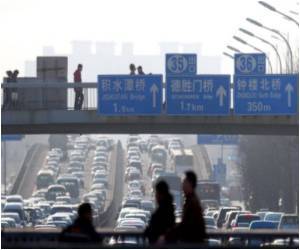
Beijing's air is among the most polluted in the world, and the problem is getting worse amid high demand for private vehicles from its increasingly affluent residents.
Vehicle sales in the first week of December were more than double the 9,000 cars sold in the same period last year, the paper said.
As of December 5, Beijing had 4.71 million registered cars on its crowded roads, it added.
China outpaced the United States as the world's top auto market in 2009 when 13.64 million units were sold nationwide. That sales figure was already surpassed in the first 10 months of this year.
Relieving traffic jams in Beijing, Shanghai, Guangzhou and Chongqing -- China's biggest cities -- will be a top government priority in the coming years, Xinhua news agency said earlier this week.
Advertisement
A new two-yuan (0.30-dollar) traffic "congestion fee" will also be charged for every litre (quart) of gasoline or diesel, the paper said.
Advertisement
Beijing government officials refused to confirm the content of the new measures, only saying that the traffic management plan had been basically approved by the nation's powerful economic planning agency.
Source-AFP









